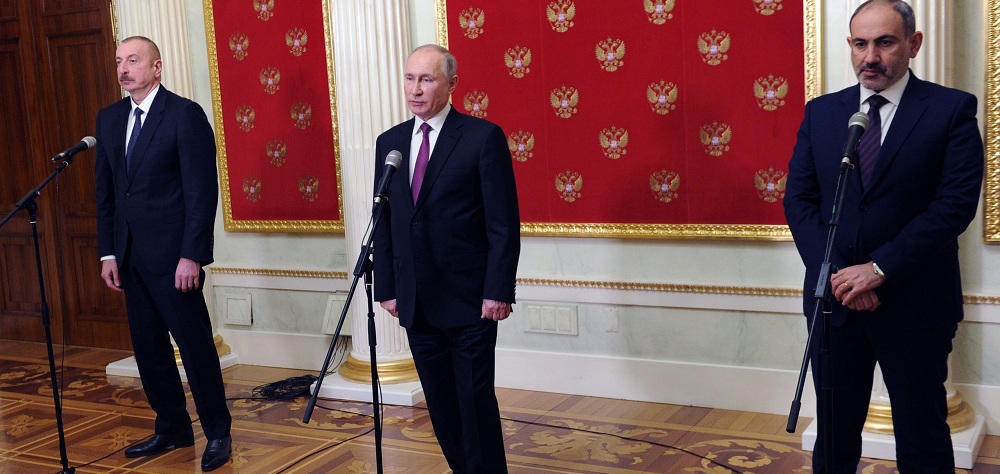Alwaght- A year from the ceasefire between Azerbaijan and Armenia, the two countries recently witnessed an escalation of border skirmishes that risked rerun to full-scale war. However, Russia immediately like before stepped in for mediation and insisted that the two states should implement the agreed-upon deal terms. On Friday, President Vladimir Putin of Russia hosted Azerbaijan's counterpart Ilham Aliyev and Armenian Prime Minister Nikol Pashinyan in the resort city of Sochi. Following the meeting, they issued a statement saying that they will form a joint commission for demarcation of the borders.
Alwaght discussed the Sochi agreement with Shoaib Bahman, an Iranian expert of Russian affairs.
Implementing the agreement main agenda of Sochi meeting
Asked about the goals of the Russian-hosted summit and the extent of its effectiveness in eliminating the differences surrounding the 2020 agreement, Mr Bahman said that essentially Sochi summit was held on the first anniversary of Karabakh war, and its main purpose was to implement the provisions of previous agreements between Azerbaijan and Armenia. The meeting was originally scheduled to be held on the anniversary of the outbreak of the clashes, but was delayed due to internal pressures on Armenian Prime Minister Sergei Pashinyan.
"Overall, the main purpose of this meeting is to discuss and review strategies on how to implement the various terms of the 2020 ceasefire agreement. Most of the articles of this agreement have been implemented so far, but the ninth one remains unadopted. The article demands reviving the traditional routes, including those of the Soviet era, and allowing to the regional states access to them."
Sochi summit not ending the dispute
Commenting on the outcomes of the Sochi summit, the Iranian expert said that the meeting will be effective in resolving disputes as Azerbaijan, with the clear support of Turkey, was willing to interpret the Article 9 of the agreement, which is the revival of transport routes, in its favor and in line with its interests. Relying on this article, Baku intends to establish a corridor from the southern parts of Armenia and connect Azerbaijan to Nakhchivan. The width of this corridor was predicted to be 5 to 10 kilometers. But what was agreed upon at the Sochi summit was not the new corridor but the revival of traditional communication routes of the Soviet era.
"In general, we can suggest that the Sochi summit can not solve all the existing problems, but will undoubtedly play an effective and fundamental role in de-escalating the dispute. Also, this meeting can not mean the end of the dispute over the Zangezur corridor, and Azerbaijan is expected to continue its expansionist agenda at the expense of Armenian interests in the future."
What's behind Moscow blocking of Ankara and Baku-eyed corridor?
According to the Republic of Azerbaijan's interpretation of the agreement, a 5 to 10 kilometers-wide corridor should be provided to Baku, which would accommodate land, rail, and even energy export lines. If this were to happen, Iran's economic, security, and geopolitical interests would be significantly threatened, but only by reviving traditional routes of the Soviet era would those threats be greatly reduced. Realization of the Turkish-Azerbaijani project could cost Iran its routes and connections to Europe, and consequently considerably cut its transit revenues. But revival of the Soviet-time routes will not be risky to Iran's interests.
"Actually, I can say that the Russian decisions serve the regional security and are in line with the Iranian interests. Moscow is well aware that the creation of the Baku-Ankara corridor could strengthen the Pan-Turkism. Certainly, given the proximity of the South Caucasus to the North Caucasus, this poses significant security threats to Russia. The corridor also could facilitate NATO access to the Caspian Sea. Considering these factors, Russia prevented the creation of such a corridor and encouraged the two sides to revive the past routes, to Iran's favor."
Tensions and dispute on Karabakh essentially remain in place despite Sochi agreement
Commenting on how far the new agreement can go in ending the decades-long dispute, Mr Bahman held that the new deal never means end of dispute because the very dispute would remain in place, as the 44-day war last year only introduced changes to 7 peripheral areas of Karabakh.
"Azerbaijan does not seem to quit its policy of seeking full control over Karabakh. Therefore, we should expect new clashes in the future. But drawing the borderlines would scale down the tensions. The main issue is persistence of the disputes, and Azerbaijan's efforts to create the corridor are of extraordinary significance.



























